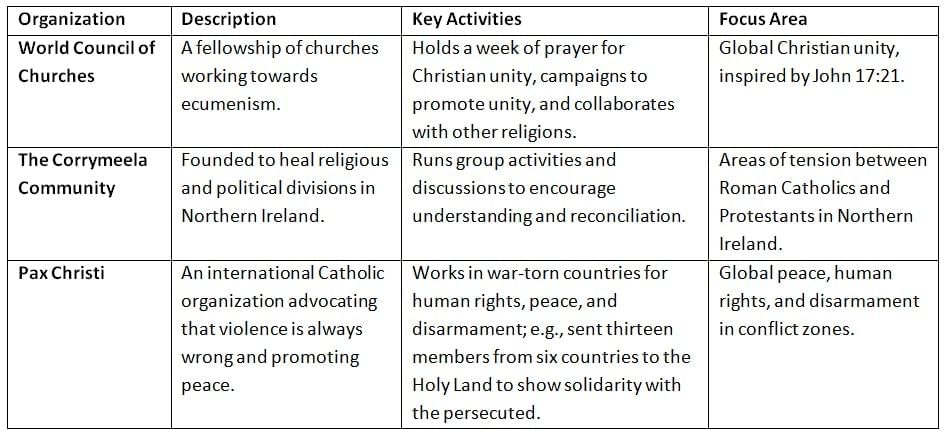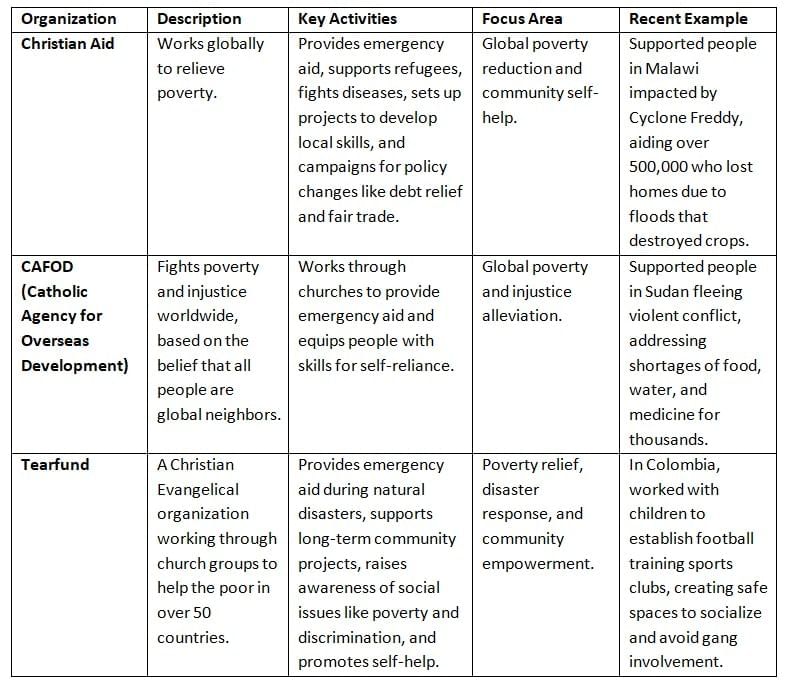Year 11 Exam > Year 11 Notes > Religion, Philosophy & Ethics for GCSE/IGCSE > The Worldwide Church
The Worldwide Church | Religion, Philosophy & Ethics for GCSE/IGCSE - Year 11 PDF Download
The Worldwide Church
Mission & Evangelism Around the World
- The term "mission" refers to being sent and reflects the calling of a religious individual or group to travel globally and share their faith.
- Missionaries spread Jesus’ message internationally by caring for others abroad.
- In the Gospel of Matthew, Jesus instructed His disciples to share His teachings worldwide and seek to convert people to Christianity.
‘Therefore, go and make disciples of all nations, baptizing them in the name of the Father and of the Son and of the Holy Spirit’ (Matthew 28:19).
- Missionaries share the Christian message abroad not only through preaching but also through actions, such as participating in development projects.
- Christianity has seen significant growth in regions like South America and Africa, where missionaries have worked on social justice initiatives and established churches.
Christianity and Reconciliation
- Reconciliation involves resolving conflicts and fostering peace between individuals or groups.
- In the Bible, Jesus declared, ‘Blessed are the peacemakers’ (Matthew 5:9), leading Christians to believe that reconciliation is essential for those who have experienced conflict.
- Just as Jesus reconciled God and humanity through atonement, Christians aim to mend relationships.
- One method of Christian evangelism is to promote reconciliation among groups worldwide that have experienced conflict.
- The Christian Church includes various denominations, which have historically caused tension and division.
- The Ecumenical Movement, or Ecumenism, seeks to unite different Christian denominations and foster unity.
- The movement aims to bring all Christian denominations together into a single Church.
- It was established in 1910 at the World Missionary Conference in Scotland, fostering greater cooperation among denominations.
- Examples include different denominations sharing church facilities or holding joint worship services, known as ecumenical services.

Church Response to Persecution
Christianity and Persecution
- Christians uphold justice and believe that all people are equal and deserve fair treatment.
- Christian organizations support those facing injustice due to poverty, war, or persecution.
- Persecution refers to persistent cruel treatment, often based on race, political views, or religious beliefs.
- Historically, Christians have endured persecution, including bullying, torture, unequal treatment, and even death.
- In some regions where Christianity is a minority, Christians face unjust treatment.
- Christians believe that Jesus’ divine commission to evangelize may involve facing danger.
- Jesus Himself was persecuted and warned His disciples that they would face persecution for their faith.
- Some Christians, including Jesus, have become martyrs, meaning they were persecuted and killed for their beliefs.
Church Responses to Persecution
- Christians pray for those facing persecution, donate to relevant charities, and may protest or petition governments for action.
- They may provide Bibles to persecuted Christians, enabling secret worship.
- In Corinthians, Paul compares Church members to parts of a body, stating:
‘If one part suffers, every part suffers with it’ (1 Corinthians 12:26).
- This motivates the Church to advocate for and support persecuted Christians worldwide.
- Organizations like Open Doors and Christian Freedom International assist persecuted Christians facing torture, imprisonment, or death for their faith.
- Other organizations also help Christians address persecution:
- The Aegis Trust works internationally to prevent genocide.
- The Barnabas Fund supports Christians facing discrimination and persecution.
Work of Christian Organizations in LEDCs
Christianity and Helping Those in Need
- Christians draw on Jesus’ teachings in the Bible to guide their efforts to help those in need.
- Jesus emphasized compassion for others.
‘Love your neighbor as you love yourself’ (Luke 10:27).
- This is illustrated in the parable of the Good Samaritan, which teaches that people should love everyone, including their enemies.
- The Bible promotes justice, asserting that everyone deserves fair treatment.
- Since God created all people equal, ignoring the needs of others is wrong, and caring for the less fortunate is a duty.
- In the Parable of the Sheep and the Goats, Jesus taught that God will judge people based on their actions, separating the righteous from the unrighteous on Judgment Day, like a shepherd separating sheep from goats.
- Christians strive to practice agape love, the selfless love Jesus described.
- They follow biblical teachings on charity, such as: ‘It is easier for a camel to pass through the eye of a needle,’ and ‘Those who have two coats, give one to the man who has none.’
- In terms of poverty, Christians are taught to use their wealth to help others, encouraging donations to charities and support for those in need.
Christian Charities Helping Worldwide

The document The Worldwide Church | Religion, Philosophy & Ethics for GCSE/IGCSE - Year 11 is a part of the Year 11 Course Religion, Philosophy & Ethics for GCSE/IGCSE.
All you need of Year 11 at this link: Year 11
|
172 docs|3 tests
|
FAQs on The Worldwide Church - Religion, Philosophy & Ethics for GCSE/IGCSE - Year 11
| 1. What is the role of Street Pastors in the community? |  |
Ans. Street Pastors are trained volunteers from local churches who provide a caring presence in urban areas, particularly at night. Their role involves helping to keep the streets safe, offering support to those in need, and engaging with people to provide a positive influence in the community. They often assist individuals who may be vulnerable due to intoxication or other issues, providing practical help and guiding them to local services.
| 2. How does the Church respond to persecution? |  |
Ans. The Church responds to persecution through various means, including offering prayer support, raising awareness, and providing aid to affected communities. Many Christian organizations work to document instances of persecution and advocate for the rights of believers around the world. The Church also emphasizes the importance of forgiveness, resilience, and faith in the face of adversity, often encouraging congregants to support those who are suffering.
| 3. What is the significance of mission and evangelism in the UK? |  |
Ans. Mission and evangelism in the UK play a crucial role in spreading the Christian faith, engaging communities, and addressing social issues. Churches participate in outreach programs, community service, and events aimed at sharing the Gospel message. The significance lies in fostering spiritual growth, supporting local communities, and responding to the changing cultural landscape, ensuring that the message of Christianity remains relevant in contemporary society.
| 4. How do Christian organizations operate in Less Economically Developed Countries (LEDCs)? |  |
Ans. Christian organizations in LEDCs often focus on holistic development, addressing physical, social, and spiritual needs. They engage in activities such as providing education, healthcare, clean water, and economic development initiatives. These organizations typically partner with local communities and churches to ensure their efforts are culturally appropriate and sustainable, aiming to empower individuals and improve overall quality of life while promoting Christian values.
| 5. What is the role of the Worldwide Church in addressing global issues? |  |
Ans. The Worldwide Church engages in various global issues such as poverty, injustice, and environmental concerns through advocacy, humanitarian aid, and development projects. It serves as a unifying body that mobilizes resources, shares best practices, and promotes collaboration among churches worldwide. The role includes raising awareness about global challenges and encouraging congregations to take action, embodying the Christian mission to serve and love others across cultural and national boundaries.
Related Searches













